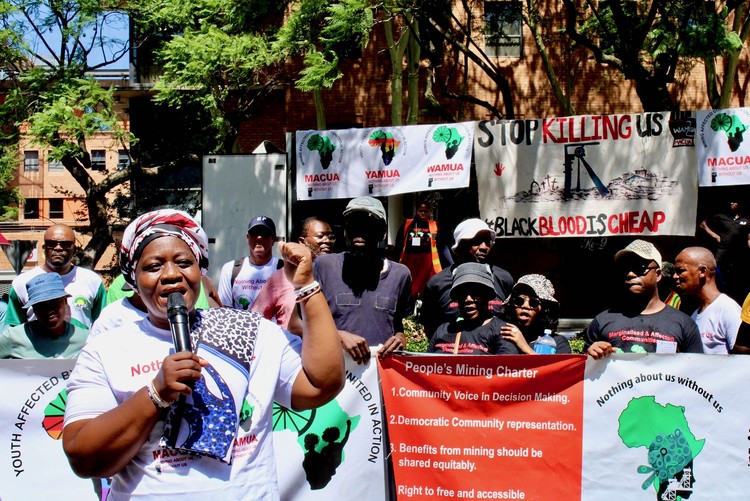
8 February 2024
Monica Ngcobo is a traditional healer from Kagung, a mining village in the Northern Cape. She joined a march by communities affected by mining activities to the Department of Mineral Resources and Energy. Photo: Masego Mafata
“Mining companies continue to violate us by displacing our people and polluting our land, yet officials in this department do nothing about it,” shouted Monica Ngcobo as she stood at the gates of the Department of Mineral Resources and Energy (DMRE) in Pretoria.
Ngcobo joined hundreds of people from Mining Affected Communities United in Action (MACUA) who marched to the department on 8 February.
The march follows MACUA’s inaugural summit, also held in Pretoria on Wednesday, where people discussed the challenges they face in communities affected by mining activity.
Marchers criticised the DMRE for being idle while people living in mining-affected communities are exploited and forcibly removed.
Ngcobo, who comes from Kagung village in the Northern Cape, said she was marching on behalf of traditional healers.
Ngcobo, a traditional healer, said her family was forcibly removed from the land where her great-grandparents are buried to make way for a mine near the village.
“If we want to go to our great-grandparents’ grave, we have to ask for permission from the mine to access the grave. At times, they don’t even permit us,” she said.
“Traditional health practitioners face challenges because mining companies continue to demolish our ancestral land where we get the herbs that we use to heal people. They also demolish the graves of our forefathers and this interferes not only with our customs but also with our work,” she said.
Marchers from the old mining town of Merafong said they were battling with sinkholes as a result of mining activity in the area and the government has done little to assist them.
Patricia Rabanye from Khutsong, a township in Merafong, said she was frustrated by the inaction by government on the growing sinkholes in Khutsong.
“It feels as though they are waiting for someone to die before doing something. The premier of Gauteng came in 2021, and other officials have also come after that, singing the same song of addressing the matter but nothing has changed,” she said.
Rabanye said she is a third-generation resident of Khutsong. Her family was displaced from Deelkraal in Carltonville when a mine in the area wanted to build a shaft on their land. Rabanye said they also have ancestral graves in Deelkraal, which they have battled to access because of the presence of the mine.
“We can’t be doing the work of DMRE, as community members, of going and monitoring the mines. They are the structure that must make sure that mines take responsibility for the impact of their activities. But they are not. Instead, they tell us they are under-resourced,” she said.
Addressing the crowd of marchers and representatives of the DMRE, MACUA’s national coordinator Meshack Mbangula delivered what he called the “the true state of our nation” where communities “continue to be exploited by mines”, receiving no assistance from the DMRE.
MACUA did not hand over a memorandum to the DMRE because the exercise has proved futile in the past, the organisation said.
However, Mbangula read out a list of demands on behalf of MACUA. These included the inclusion of mining-affected communities in decision-making processes, legislation that makes it binding for mining companies to seek free, informed and prior consent from communities, and an overhaul of the Mineral and Petroleum Resources Development Act (MPRDA).
Siyabonga Vezi the regional manager of DMRE said while it was difficult to respond to MACUA because no memorandum had been handed to them, he will “pass MACUA’s message to the general director”.
Vezi said the DMRE engaged “consistently” with mining-affected communities, with the most recent engagement being a summit in September last year to “review the MPRDA”.
According to Gudani Tshikota, MACUA MPRDA/Democracy project leader, their request to DMRE for meaningful inclusion in the summit last year was denied.
“We asked to co-facilitate sessions with them at this summit because we understand the issues faced by communities affected by mining activities, but they did not grant our request,” he said.
Tshikota said MACUA wanted engagement with DMRE and mining-affected communities to be meaningful and not just a “box-ticking exercise”.